The week ahead in Parliament
- Published
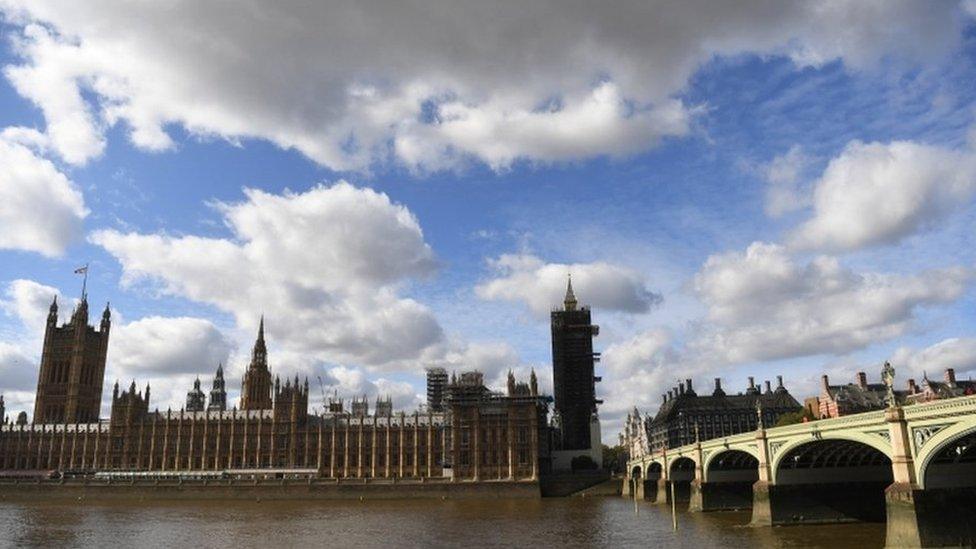
The government has already flagged up that the coming week's programme could well be re-jigged at short notice to allow for debates on Covid-19 regulations or other pandemic developments
And these could be very big events, given the growing tensions over the government's strategy.
But here are five things to watch out for next week:
Rebel, Rebel: The Tory rebellion and abstentions in last Tuesday's retrospective vote on the 22:00 closing time regulations demonstrated the government could find itself in real trouble if an issue arises where lockdown-sceptic backbenchers could make common cause with newly pro "circuit-breaker" Labour.
Not an easy trick but possible, depending on what (if any) new Covid regulations might be put to MPs.
New kids on the block: The pandemic has given new prominence to England's metro mayors, and it will be interesting to see if MPs on their patches feel pressured to follow the line they take on new virus restrictions.
But suddenly, it feels like these relatively new creations have taken on a real political life of their own.
Je ne regrette rien: There are two rival "regret motions" down against the second reading of the UK Internal Market Bill in the House of Lords.
Perhaps I can ask a heretical question - who cares? Regret motions have no effect so they're a kind of parliamentary pout.
While it wouldn't surprise me if peers passed one of them, the real action on the UKIMB will come when they start voting on amendments at report stage a couple of weeks down the road.
Meanwhile in Brussels: Largely eclipsed by pandemic developments, the talks on a post-Brexit trade deal may lead to a major statement to MPs, and a real prospect of agreement could also lead to the government slowing down the consideration of UKIMB as a kind of peace gesture.
Petition for lunch: Marcus Rashford's petition to end child food poverty and provide free meals during all school holidays smashed through the 100,000 signature barrier where it is automatically considered for a Westminster Hall debate, and, as I write, is nearing 200,000 names just a day after it launched.
This could be the biggest example yet of the influence of hashtagged social media campaigns on what is debated in Parliament and, by extension, on government policy.

Footballer Marcus Rashford will have his petition debated in Parliament
It's also an interesting week for the balance of power between MPs and Peers.
Their lordships have spent many happy evenings rewriting government legislation, and the Commons keeps bouncing the bills back to them with their amendments struck out.
This week, peers will decide whether to stick or twist on the Agriculture Bill on Tuesday and the Immigration and Social Security Coordination (EU Withdrawal) Bill on Wednesday.
Will they remain defiant and send back some marginally watered-down version of their changes and ask MPs to think again?
Or will they mutter to themselves, "well, we've tried", and accept the decision of the Commons?
The decisions should supply some useful context for the changes they're likely to make to the UKIMB.
Anyway, here's my rundown of the week ahead:
Monday 19 October
The Commons week begins at 14:30 with an hour of work and pensions questions, after which any post-weekend statements or urgent questions will follow.
There is plenty of space for, for example, a big Covid-19 statement.
The main business is consideration of Lords amendments to the Immigration and Social Security Co-ordination (EU Withdrawal) Bill.
The government was defeated on no less than seven amendments in the Upper House.
The key one was Lord Dubs' amendment to ensure that rights under UK law to family reunion - currently covered by the Dublin III Treaty EU regulations - will continue after the transition period.
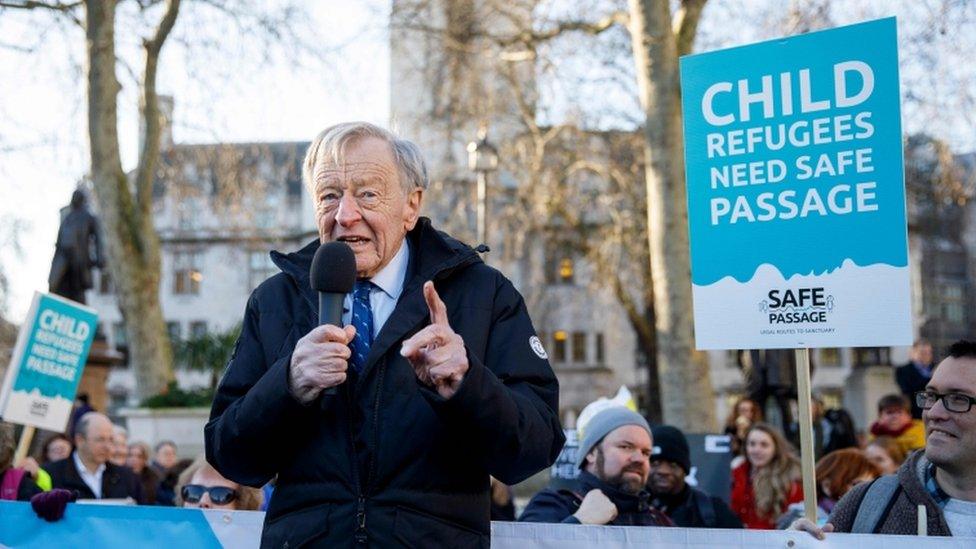
Lord Dubs came to the UK on the Kindertransport to escape the Nazis
In Westminster Hall, MPs will debate petitions on pet theft, which call for it to be made a specific offence, distinct from theft of inanimate objects.
They argue that, in sentencing, the courts must consider the "fear, alarm or distress to the pet and owners and not monetary value".
That's followed by a debate on e-petition 321862 on immigration, which calls for the rapid removal of illegal immigrants - this one could be quite lively.
On the committee corridor, Public Accounts discusses money - no change there.
But this is a more literal session at 14:30 on the production and distribution of cash, with witnesses including the chief cashier of the Bank of England and the CEO of the Royal Mint.
In the Lords, the day begins at 13:00 with the introduction of Lord Dodds of Duncairn - the DUP's former Westminster leader Nigel Dodds, who lost his seat at the general election.
Questions to ministers cover the future of historic statues in England, the cost of the government's decision to appeal the High Court ruling that charging £1,000 for children to register as British citizens was unlawful, and the review of the Gender Recognition Act.
The main event is the second reading debate on the United Kingdom Internal Market Bill, which gives the government powers to break its commitments under the EU Withdrawal Agreement, and therefore break international law in a "limited and specific way".
This is where we will see those regret motions I mentioned, from the convenor of the crossbenchers, and former Lord Chief Justice, Lord Judge, and from the Tory grandee, Lord Cormack.
Bring popcorn, and maybe sandwiches - with 91 speakers already listed, the debate will spill over into Tuesday.
Tuesday 20 October
MPs open at 11:30 with Treasury questions.
The day's Ten Minute Rule Bill from Labour's Stella Creasy would give employees the right to information about the pay given to people doing the same or a similar job - arguing you can't know if you're being discriminated against without that information.
MPs then polish off the Non-Domestic Rating (Lists) (No. 2) Bill, which postpones the next business rates revaluation until April 2023, before moving to a general debate on Black History Month.
This is about as uncontroversial as legislation gets.
In Westminster Hall at 09:30, there's a debate on support for children and families during the Covid-19 outbreak.
While on the committee corridor, Health and Social Care takes evidence on workforce burnout and resilience in the NHS and social care
In the Lords at 12:00, ministers field questions on helping armed forces personnel from Commonwealth countries to settle in the UK and the new cancer task-force.
There will also be a debut question from the long-serving former arts minister, Lord Vaizey of Didcot, on and the financial impact on the retail and tourism sector of the decision to withdraw the VAT retail export scheme.
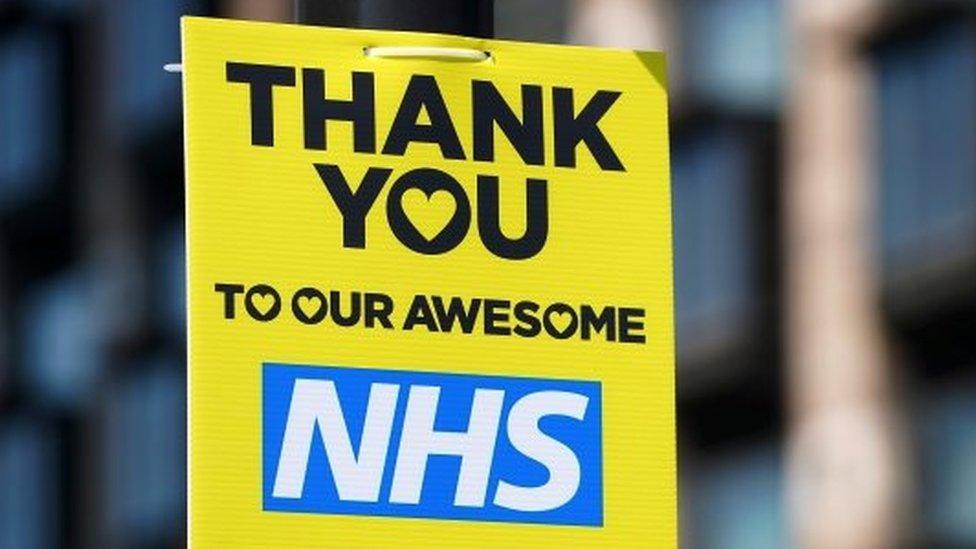
Burnout of NHS staff will be up for discussion on the committee corridor
That is followed by further debate on the UK Internal Market Bill - including the winding speeches.
Then peers debate the Health Protection (Coronavirus, Restrictions) (No. 2) (England) (Amendment) (No. 5) Regulations 2020 (1029) - an iteration of the regulations limiting the size of gatherings in various venues, amended several times during the crisis, with the latest being the introduction of the 22:00 closing time.
Peers will also be considering "Commons reasons" for rejecting the amendments they had made to the Agriculture Bill.
New amendments are being put up by two of the key voices in their earlier debates - Labour's Lord Grantchester and the crossbencher and former NFU stalwart, Lord Curry of Kirkharle - so there may be a further round of "ping pong" with MPs.
Wednesday 21 October
The Commons opens at 11:30 with half an hour of women and equalities questions, followed by Prime Minister's Question Time
The day's Ten Minute Rule Bill, from new-intake Conservative Andrew Griffith, is on Vehicle Registration Offences (Penalty Points).
He wants to tackle anti-social drivers of expensive high performance machines, especially in less policed rural areas, who defy speed limits and number plate recognition cameras by using number plates with small or non-standard fonts that cannot be read from a distance or by cameras.
Mr Griffith's bill would make number plate offences under the Vehicle Excise and Registration Act 1994 endorsable and consequently subject to penalty points on the recipient's driving license.
That's followed by two Labour opposition day debates on "fire and re-hire" and social care.
On the committee corridor, Home Affairs quizzes a series of police witnesses at 09:45 about Home Office preparedness for Covid-19, while the Treasury Committee hears from two panels of economic experts at 14:30 on the economic impact of coronavirus.
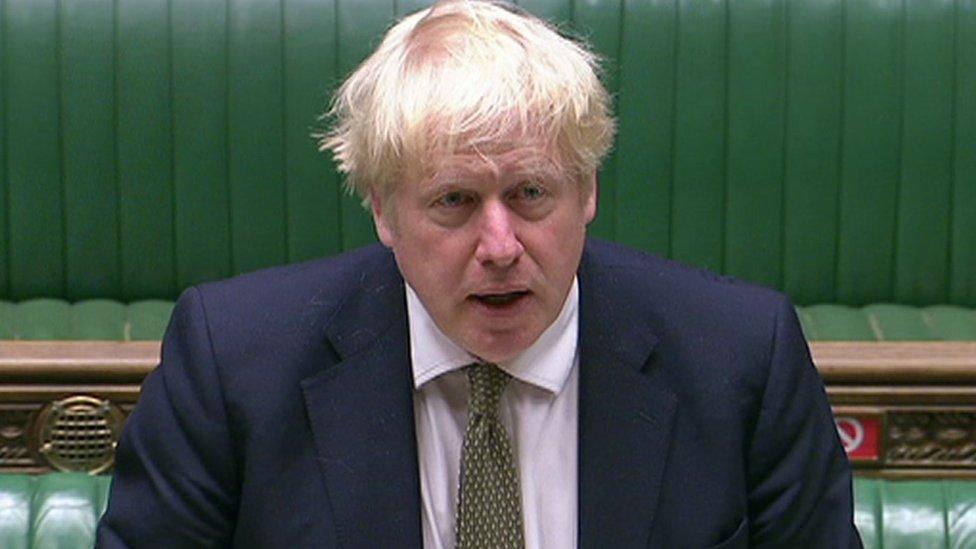
Boris Johnson will return to the Commons on Wednesday for PMQs
In the Lords at 12:00, ministers face questions on the review of rail schemes in Network Rail's enhancements pipeline and whether High Speed 2 faces a similar review.
There will also be questions on the impact on prisons and prisoners of increasing the maximum period of remand in custody by eight weeks and agreement on visa-free short-term travel in the Brexit negotiations.
Then peers will consider some orders and regulations, starting with Pension Protection Fund (Moratorium and Arrangements and Reconstructions for Companies in Financial Difficulty) (Amendment) Regulations 2020, which deals with the rights of pensions scheme members when companies seek a moratorium to give them respite from their creditors.
This is followed by the Immigration and Social Security Co-ordination (EU Withdrawal) Bill votes on the Commons reasons - another round of parliamentary ping pong - with debate expected to focus on child refugees (the Dubs amendment), EU settled status and the right of return.
Thursday 22 October
MPs begin at 09:30 with transport questions, followed by the weekly business statement from the Leader of the House - setting out the agenda for the Commons for the week after their half-term break.
The main event is a general debate on Covid-19. These are now a regular fixture, and another has been pencilled in for 3 November - the first day back after the break.
In Westminster Hall at 13:30, there is a debate on the transparency of the Integrated Activity Fund - the £1.2bn a year Foreign Office aid programme intended to support global security and peace building in conflict zones.
Human rights campaign group Reprieve says it has funded the training of prison officers and others complicit in abuses in Bahrain.
That is followed at 15:00 by a debate on the Ministry of Justice legal aid budget, led by Justice Committee chair Sir Bob Neill.
On the committee corridor at 10:30, Business, Energy and Industrial Strategy continues its "levelling up" inquiry, with evidence from metro-mayors, including Greater Manchester's Andy Burnham, Liverpool City region's Steve Rotheram, North of Tyne's Jamie Driscoll and West of England's Tim Bowles.
The focus will be on their powers to attract investment and promote economic growth, but it will also look at the impact Covid-19 might have on the government's levelling up agenda.
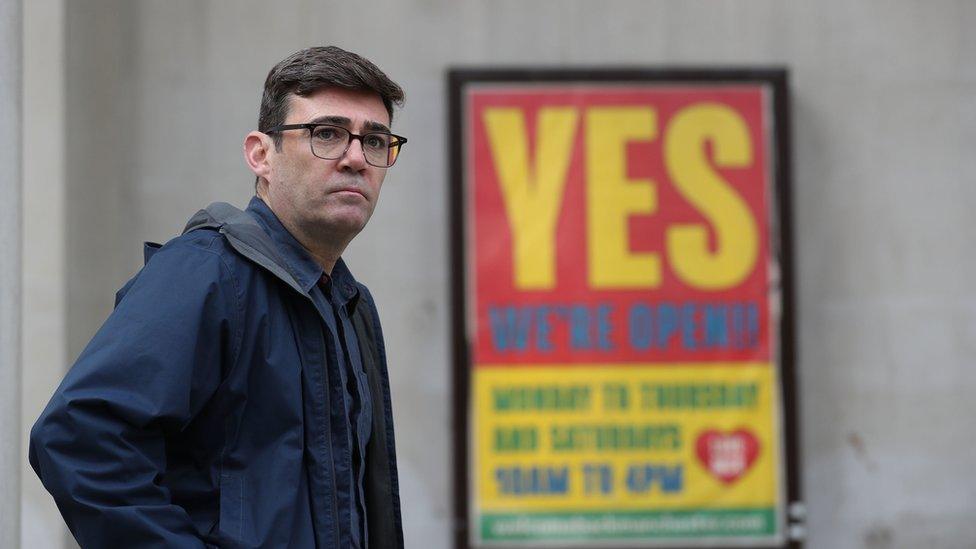
Metro Mayor Andy Burnham will make an appearance in Parliament this week
In the Lords at 12:00, there are questions on the role of alms-houses in housing the elderly, the impact of the pandemic on the gig economy, and the legacy of the Troubles in Northern Ireland.
Then peers debate a series of local anti-Coronavirus regulations, covering restrictions on household mixing in private dwellings and gardens in Leeds, Wigan, Stockport and Blackpool, and restrictions on households and businesses in Gateshead, Newcastle, Northumberland, North Tyneside, South Tyneside and Sunderland.
Friday 23 October
It's another Private Members Bill day in the Commons from 09:30.
They're coming thick and fast at the moment because of rescheduling due to the pandemic.
But, as ever, it's unlikely that more than the first three bills will be debated - so while there might be some interest in some of the measures lurking further down the agenda, they're unlikely to be considered before time runs out.
First up is the second reading of the Animal Welfare (Sentencing) Bill from the Conservative MP Chris Loder.
This would increase the maximum penalty for cruelty offences from six months to up to five years.
He argues that more stringent sentencing will act as a greater deterrent against animal cruelty.
Sir Christopher Chope's Mobile Homes Act 1983 (Amendment) Bill and his Caravan Sites Bill will also come up.
After that, MPs take a half-term break, returning on 3 November - but the Lords can carry on legislating through the final week of October.
